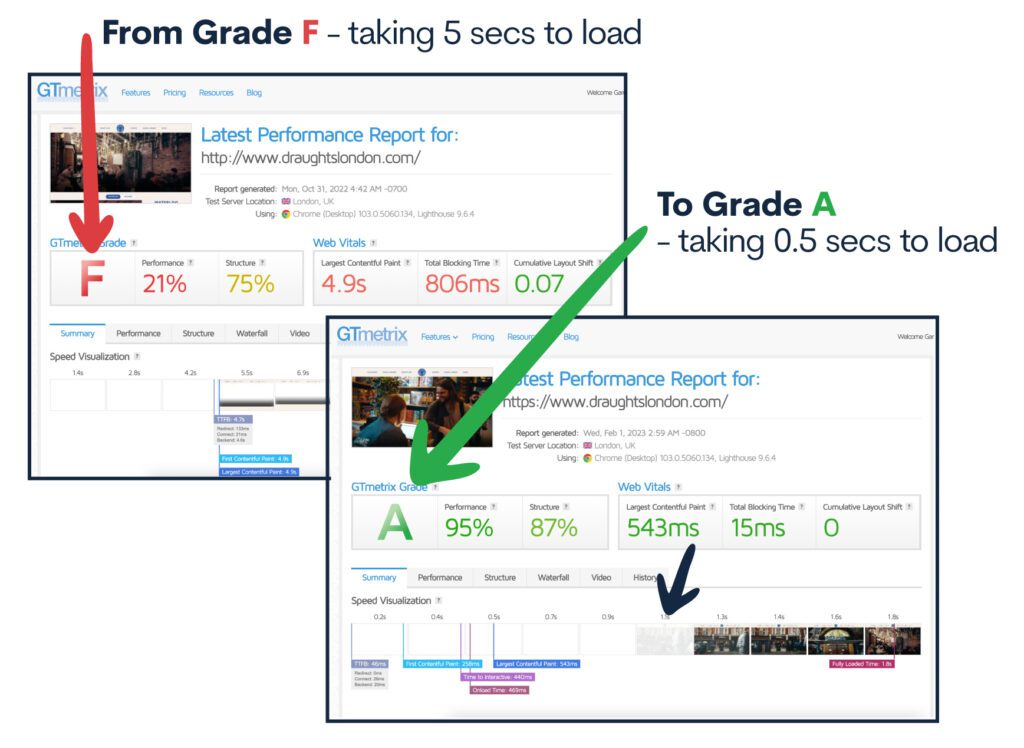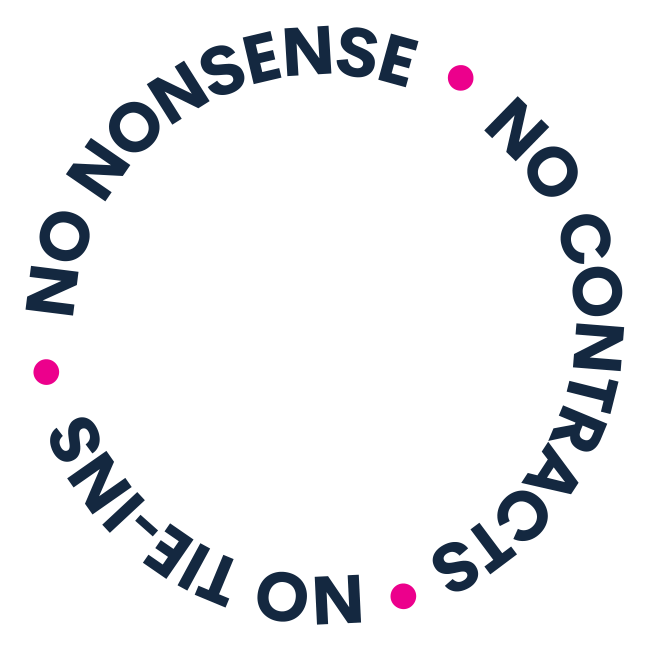Website speed Optimisation
Website Site Performance Devon
Boost your website speed and keep your visitors engaged and increase ranking with our optimisation services!
need for speed
Why is page speed important?
Studies suggest that the patience threshold for an online user typically lies between 0.3 and 3 seconds. Any longer, and there’s a risk that the user will get distracted and may even exit the browser.
Quicker websites tend to register lower bounce rates, improved conversion ratios, better positions in organic search results, and naturally, superior user experience.
In essence, a sluggish website could dent your finances and tarnish your brand reputation. Conversely, investing in speeding up your web pages can boost traffic, enhance user loyalty, and augment sales.
How can we help?
We will perform an audit and then based on the outcome of that audit get to work on making your site fast, snappy and perform as well as it can.
Clients Case Study: www.draughtslondon.com
Draughts London have some fantastic videos on their site to showcase their great venue. Sadly these videos amongst other elements on the site were slowing it down, with some visitors to the site experiencing a load time of well over 5 seconds. No one wants to wait and people were leaving the site rather than waiting.
We consulted with Draughts London and then after auditing and troubleshooting we were able to make changes to speed up the site to under a second, 0.5 seconds to be exact. With our ongoing maintenance package and we keep the site snappy and ontop of it’s game.

Why Is Page Speed Important?
Page Speed and User Attention
Users typically have a patience threshold between 0.3 and 3 seconds. Any delay beyond this could lead to loss of focus or even closing the browser.
Reduced Bounce Rate
Faster websites are likely to have lower bounce rates, indicating that users stay on the site longer and interact more with the content.
Enhanced Conversion Rates
A quick-loading website can lead to improved conversion rates, positively impacting your business’s sales or lead generation.
Improved Organic Ranking
Speed is a ranking factor in search engine algorithms. Faster websites often rank higher in organic search results, making them more visible to potential visitors.
Better User Experience
Quick page load times contribute to a more seamless and satisfactory user experience, which can increase user loyalty.
Financial Impact
Sluggish websites could negatively impact finances by reducing user engagement, conversions, and potentially leading to lost sales.
Brand Perception
Page speed can influence your brand’s reputation. Slow-loading sites might lead to a perception of inefficiency, which could potentially harm your brand image.
Traffic and User Retention
Enhancing the speed of your web pages can increase traffic and improve user retention, both of which are vital for your site’s success.
- no contracts

- no tie-ins

- no nonsense

Why Is Website Page Speed Important?
In today’s digital landscape, the speed of a website’s pages plays a pivotal role in the overall user experience and the success of a business online. In simpler terms, the quickness with which a site loads its content is commonly referred to as website page speed. This speed has implications not only for user satisfaction but also for a website’s performance in search engine rankings, making it an integral part of any site’s search engine optimisation (SEO) strategy. This in-depth guide explores the importance of website page speed, shedding light on its impact on SEO and how to optimise it for the best results.
Understanding Website Page Speed
Website page speed, in essence, is the time it takes for a webpage’s content to load and become visible to the user. This speed is a complex measure that involves multiple elements and is influenced by a variety of factors. To better understand this, it’s helpful to break down the components of website page speed:
Time to First Byte (TTFB)
This is the duration it takes for the first byte of information on a page to load, indicating the response speed of the server.
Time to Interactive (TTI)
TTI measures the time needed for a webpage to load its interactive elements. This metric is crucial in assessing whether a site’s use of javascript may be hindering its loading speed.
First Contentful Paint (FCP)
FCP is the time taken for the first piece of content (be it text, an image or SVG) to load and appear on a webpage.
Load Time
Load time refers to the total time needed for all the elements on a page to fully load.
The Significance of Website Page Speed
Website page speed has substantial implications for a site’s SEO, user experience (UX), and conversion rate optimisation (CRO). In essence, a faster-loading website performs better across a range of marketing metrics.
Website Page Speed and SEO
Website page speed is one of the key factors that search engines, such as Google, consider when ranking websites in their search results. Google in particular emphasises the importance of speed, using it as a ranking signal in its algorithm. The faster a website can load its pages, the more pages Google can crawl at a given time, which can positively impact a site’s search performance.
Website Page Speed and User Experience
User experience is closely linked to a website’s page speed. In the digital realm, users often expect instant results, and if a webpage takes too long to load, they are likely to abandon it and look elsewhere. As such, faster websites create a better user experience, leading search engines to prioritise these sites over slower ones in their rankings.
Website Page Speed and Conversion Rate Optimisation
Improving a website’s page speed can significantly boost its conversion rate. A faster-loading website reduces the number of users who abandon the site due to slow load times, thereby increasing the chances of converting visitors into customers.
The Impact of Website Page Speed on Mobile SEO
In an era where mobile browsing is prevalent, mobile page speed optimisation is of paramount importance. Mobile pages are considered separately for SEO purposes and do not automatically inherit the SEO ranking of the main site. As such, the mobile version of a site should be optimised for speed to ensure high search performance.
Factors Affecting Website Page Speed
Several elements can slow down a website’s loading speed. Some of the most common issues include:
Unoptimised Images and Videos
Images and videos can significantly increase a webpage’s load time due to their large file sizes. They make up a substantial portion of a page’s overall size and, when unoptimised, can considerably slow down a site’s loading speed.
Code Overhead
Code overhead, or code bloat, can also affect a website’s speed. When a site uses an off-the-shelf content management system (CMS), it has to carry a lot of code that may not be relevant to the site, which can slow down its loading speed.
Server Efficiency
The efficiency of a website’s server plays a vital role in its loading speed. If a site’s host cannot deliver files quickly, it can impact the site’s loading speed, regardless of how optimised the site’s files are.
Usage of Heavy Apps and Complicated Themes
The use of heavy apps, such as Flash, and overly complicated themes and designs can negatively affect a website’s page speed.
Embedded Media
Embedded media, such as videos sourced from another site, can slow down a webpage’s loading speed.
How to Improve Website Page Speed
Improving a website’s page speed involves taking several steps, some of which include:
Choosing a Good Host
Choosing a good host is crucial to ensuring a fast website. A slow server can hinder a website’s performance, even if the site itself is optimised for speed.
Reducing Image and File Sizes
Reducing the size of the files and images on your website can significantly improve its loading speed. This can be achieved through image optimisation, involving the compression of images and the use of responsive images.
Leveraging Browser Caching
Browser caching involves storing a version of your webpage in the browser so that the entire page does not have to be reloaded each time a user revisits it. This can greatly enhance your website’s speed.
Minimising Code
Minimising code can help reduce code bloat, which can slow down a website. This involves removing unnecessary characters from your site’s source code without changing its functionality.
Simplifying Redirects
Multiple redirects can slow down a website as users are moved from one URL to another before reaching their destination. Simplifying the redirects can reduce unnecessary steps and speed up page loading times.
Testing Website Page Speed
Testing website page speed is crucial in assessing a site’s performance and identifying areas for improvement. Tools such as Google’s PageSpeed Insights can provide valuable insights into a site’s loading speed and offer suggestions for optimisation.
The Future of Website Page Speed
As the digital landscape continues to evolve, the importance of website page speed in SEO and user experience is likely to increase. As Google continues to prioritise mobile-friendly sites and those providing a positive page experience, the focus on improving page speed is expected to intensify.
Improving website page speed is crucial for enhancing user experience, boosting SEO performance, and increasing conversion rates. By understanding the importance of page speed and implementing strategies to optimise it, businesses can significantly improve their online presence and success.
As the digital world continues to evolve, the speed at which a website’s pages load will continue to play a pivotal role in how well it performs online. Prioritising page speed can lead to improved SEO, a better user experience, and higher conversion rates. So whether you’re a business owner, a web developer, or an SEO specialist, understanding the importance of website page speed and how to optimise it should be a key part of your digital strategy.
Get in Touch
If you have any questions or need help with your website page speed optimisation, our team is here at Dot Media. We’d love to hear from you. Please contact us for further information or assistance.
Remember, your website’s speed is not just about keeping pace with the digital world. It’s about providing a fast, efficient, and user-friendly experience that keeps your audience coming back for more.
WEBSITE A GHOST TOWN?
Check out our SEO Services
FANCY A CHAT?
We will have a chat through your business, opportunites that are relevant and how we might be able to help. No sales pitches, pressure or nonsense just a 15 minute overview of where you are.

Let's have a chat - Book a 15 minute Discovery Call below
FAQ
Websites are speed optimised to improve user experience, decrease bounce rates, and improve conversion rates. Faster loading times can also positively impact the site’s organic search rankings, as page speed is a ranking factor in search engine algorithms.
A good performance speed for a website is typically under 2-3 seconds. Users tend to lose interest or patience with sites that take longer to load, leading to a potential loss of engagement or conversion opportunities.
Optimising web pages for speed involves several strategies including minimising HTTP requests, optimising images, enabling browser caching, minifying resources (HTML, CSS, JavaScript), reducing server response time, using a content delivery network (CDN), and eliminating render-blocking JavaScript and CSS.
Speed optimisation in SEO refers to the process of making your website load faster to improve its ranking on search engines. This can be achieved through various methods such as minimising code, reducing server response times, optimising images, and leveraging browser caching.




